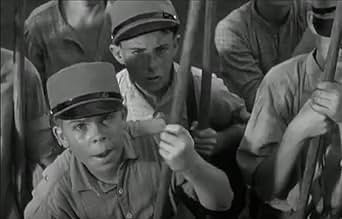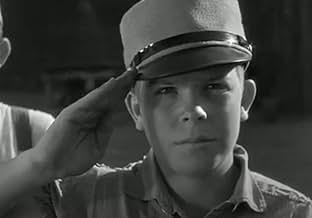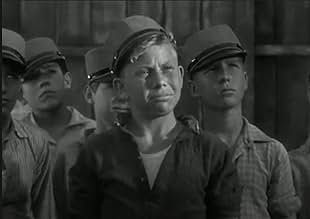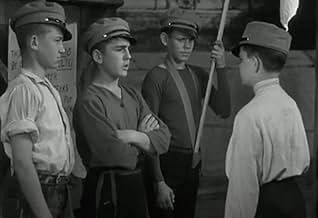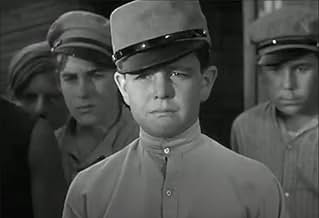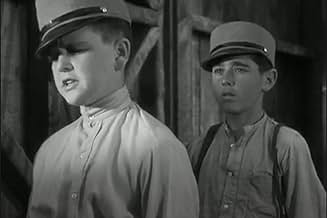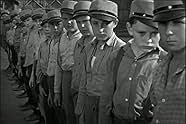IMDb RATING
6.9/10
578
YOUR RATING
Frail Nemecsek, a lonely boy craving belonging, idolizes charismatic Boka, leader of a gang, in an evocative depiction of youth's pain and war's senselessness.Frail Nemecsek, a lonely boy craving belonging, idolizes charismatic Boka, leader of a gang, in an evocative depiction of youth's pain and war's senselessness.Frail Nemecsek, a lonely boy craving belonging, idolizes charismatic Boka, leader of a gang, in an evocative depiction of youth's pain and war's senselessness.
- Director
- Writers
- Stars
- Awards
- 3 wins & 1 nomination total
George P. Breakston
- Nemecsek
- (as George Breakston)
Jimmy Butler
- Boka
- (as Jimmie Butler)
Samuel S. Hinds
- Father
- (as Samuel Hinds)
- Director
- Writers
- All cast & crew
- Production, box office & more at IMDbPro
Featured reviews
What makes NO GREAT GLORY atypical for Borzage is that there is no central romantic couple, but this film, a stirring and vivid anti-war drama from the perspective of children (based on Molnar's THE BOYS OF PAUL STREET, which has been filmed on several other occasions), remains one of Borzage's most powerful, and shows the great range of his talent. Using a large cast of children, he is able to get some of the finest performances from many of the child actors, most of whom were Hollywood veterans by this point: George Breakston, Frankie Darro, etc. Yet here, with Borzage's patient guidance, they give fresh and touching performances. Borzage is always able to find great humanity in his performers, and the sorrowful story becomes truly tragic, because Borzage truly engages your emotions and your mind. This is another movie that is not available, and should be made available (and should be shown as often as possible).
This is a bizarre and very heavy-handed film. Instead of showing adults at war, this film does war on a small scale--with children playing war. This isn't just kids playing war, but they have ranks, follow orders and act much like adults would in war. And, almost the entire film consists of kids acting--with only a few adults here and there. This strange idea seemed to impress most of the reviewers but I couldn't get into it--mostly because it all seemed rather fake and I also thought that children playing war and acting as if it's all lots of fun just seemed a bit grotesque. Although I know it was meant as an allegory about war and heroism and the futility of war--it seemed like it could also be taken as a pro-war film as well! As for the kids, all but Frankie Darro were unknowns and the acting, for kids, was pretty good. But it was also sappy from start to finish--and also made war seem pretty cool--like a recruitment film for the next war.
I guess I am a voice of dissent, but I didn't like the film--though I did at least respect the acting (for the most part) and give it a 4 simply for technical merit. Also, I nominate George P. Breakston for a special award for Best Performance By a Crazy Kid for his acting at the 61 minute mark. It has to be seen to be believed. Further, I nominate all the parents for the Most Irresponsible Parenting award for encouraging their little ragamuffins to become little warmongers.
I guess I am a voice of dissent, but I didn't like the film--though I did at least respect the acting (for the most part) and give it a 4 simply for technical merit. Also, I nominate George P. Breakston for a special award for Best Performance By a Crazy Kid for his acting at the 61 minute mark. It has to be seen to be believed. Further, I nominate all the parents for the Most Irresponsible Parenting award for encouraging their little ragamuffins to become little warmongers.
I am 53 years old. When I was 12 my father told me to stay home from school to see this movie on television. The movie was a tearjerker classic that every boy, girl and adult should see. Unfortunately this was the last time I ever saw it. It is listed with 5 out of 5 stars in the blockbuster movie guide and I concur. There was reportedly a remake of this film, I believe in color, but not the same title. I would love to hear of anyone who knows if either film still exists and especially if it will be shown anywhere. I'm hoping that Ted Turner has it intact in his collection for TCM. If I never see it again I at least hope all of you see it at least once. Thank you
No Greater Glory is Frank Borzage's adaption of a biographical novel by Ferenc Molnar. It's set in the postwar depression that Germany had after World War I. As it opens we first see a veteran talking about the futility of war and then it cuts to a German school where the boys, there are no women in this film other than the lead character's mother, are being spoonfed the same militaristic propaganda that sent Lew Ayres and his friends off to the trenches.
These kids learn well and Lord of the Flies like they split into communities, rival communities that we call gangs. The gang we first meet is the Paul Street Boys and their leader Jimmy Butler. Another group of slightly older kids are trying to push these kids out of the vacant lot that the Paul Street kids play in. This means war and these kids have developed their own rules about it.
One kid, small and scrawny George Breakston wants so much to belong to the gang, but the others tease him and tell him he's too little. He spends the rest of the film trying to prove himself worthy.
No Greater Glory is a really heartbreaking film about kids with misplaced values, the kind who would later become good recruiting fodder for the Nazis. Breakston's performance will elicit tears from the stone lions at the New York Public Library. Frankie Darro and Butler as the rival gang leaders do well by their roles.
I'd love to know how Frank Borzage got Harry Cohn at Columbia Pictures to OK this project. It's a B film, no big stars involved at all, still it's not the most commercial of projects. Yet if you do see it, you will discover a classic.
These kids learn well and Lord of the Flies like they split into communities, rival communities that we call gangs. The gang we first meet is the Paul Street Boys and their leader Jimmy Butler. Another group of slightly older kids are trying to push these kids out of the vacant lot that the Paul Street kids play in. This means war and these kids have developed their own rules about it.
One kid, small and scrawny George Breakston wants so much to belong to the gang, but the others tease him and tell him he's too little. He spends the rest of the film trying to prove himself worthy.
No Greater Glory is a really heartbreaking film about kids with misplaced values, the kind who would later become good recruiting fodder for the Nazis. Breakston's performance will elicit tears from the stone lions at the New York Public Library. Frankie Darro and Butler as the rival gang leaders do well by their roles.
I'd love to know how Frank Borzage got Harry Cohn at Columbia Pictures to OK this project. It's a B film, no big stars involved at all, still it's not the most commercial of projects. Yet if you do see it, you will discover a classic.
In a busy military hospital, one German soldier bemoans participating in a deadly World War, shouting out, "Patriotism is a loathsome lie!" Then, the story dissolves to a Hungarian schoolteacher telling his young students, "There is nothing finer than Patriotism, nothing nobler than War in defense of the country!" Keeping a few of the boys after school, for passing notes, reveals they are part of a gang. They are "The Paul Street Boys", and they are being threatened by older teenage gang "The Red Shirts" who want to take control of a vacant lot. The lot is the only one left in the neighborhood where the gang can meet and play. "The Paul Street Boys" like to play war games.
Most of the two dozen members of the gang are officers. Only small but determined George Breakston (as Erno Nemecsek), remains a "Private". Young blonde Breakston is the smallest because he won't wear heels. He's also clumsy and admits to being afraid - but "Nemecsek" possesses an enviable amount of determination. Despite being made a scapegoat in the group, Breakston admires "The Paul Street Boys" courageous leader Jimmy Butler (as Boka), who is reelected over a scheming Jackie Searl (as Gereb). Young Searl gets only two votes, from himself and the confident winner.
The boys are playing marbles when "The Red Shirts" cocky leader Frankie Darro (as Feri Ats) arrives on screen. Mr. Darro is obviously going to be hard to beat. Darro has already made inroads; working for the enemy, Searl lets Darro sneak into the "Paul Street Boys" lot and steal their flag. That evening, Breakston volunteers for a dangerous mission - to accompany leader Butler and banana lover Donald Haines (as Csonakos) to "The Red Shirts" camp, and bring back their flag. You'll have to see for yourself how successful they are, but you can be sure the gangs go to War...
An interesting side effect of Breakston's capture is the respect Darro has for his enemy's heroics. Breakston would find himself a more valued member of Darro's gang, but never wavers in his support for Butler. These relationships are highly intriguing. You can probably read a lot of different things in the allegorical story (my favorite "reading" is of "Nemecsek" as Jewish, but there are other interpretations). This film is clearly from a superior source, even without the introduction, "From Ferenc Molnar's immortal book." As it turns out, this is a classic novel from Hungry. For upshot Columbia Pictures, director Frank Borzage, photographer Joseph August, and editor Viola Lawrence excel.
Each of the performers are outstanding, with an amazing lead by Breakston. He may tend toward the sentimental, but plays it as directed. The producers and/or Mr. Borzage seem to have added an "All Quiet on the Western Front" type opening, which partially works; really, the story was strong enough as is. Also regrettable is the decision to intentionally speed up the film in selected parts. Incredibly, this received an homage in the opening of the excellent 1969 re-make, which was nominated for an "Academy Award" in the foreign language category.
******** No Greater Glory (3/14/34) Frank Borzage ~ George Breakston, Jimmy Butler, Frankie Darro, Jackie Searl
Most of the two dozen members of the gang are officers. Only small but determined George Breakston (as Erno Nemecsek), remains a "Private". Young blonde Breakston is the smallest because he won't wear heels. He's also clumsy and admits to being afraid - but "Nemecsek" possesses an enviable amount of determination. Despite being made a scapegoat in the group, Breakston admires "The Paul Street Boys" courageous leader Jimmy Butler (as Boka), who is reelected over a scheming Jackie Searl (as Gereb). Young Searl gets only two votes, from himself and the confident winner.
The boys are playing marbles when "The Red Shirts" cocky leader Frankie Darro (as Feri Ats) arrives on screen. Mr. Darro is obviously going to be hard to beat. Darro has already made inroads; working for the enemy, Searl lets Darro sneak into the "Paul Street Boys" lot and steal their flag. That evening, Breakston volunteers for a dangerous mission - to accompany leader Butler and banana lover Donald Haines (as Csonakos) to "The Red Shirts" camp, and bring back their flag. You'll have to see for yourself how successful they are, but you can be sure the gangs go to War...
An interesting side effect of Breakston's capture is the respect Darro has for his enemy's heroics. Breakston would find himself a more valued member of Darro's gang, but never wavers in his support for Butler. These relationships are highly intriguing. You can probably read a lot of different things in the allegorical story (my favorite "reading" is of "Nemecsek" as Jewish, but there are other interpretations). This film is clearly from a superior source, even without the introduction, "From Ferenc Molnar's immortal book." As it turns out, this is a classic novel from Hungry. For upshot Columbia Pictures, director Frank Borzage, photographer Joseph August, and editor Viola Lawrence excel.
Each of the performers are outstanding, with an amazing lead by Breakston. He may tend toward the sentimental, but plays it as directed. The producers and/or Mr. Borzage seem to have added an "All Quiet on the Western Front" type opening, which partially works; really, the story was strong enough as is. Also regrettable is the decision to intentionally speed up the film in selected parts. Incredibly, this received an homage in the opening of the excellent 1969 re-make, which was nominated for an "Academy Award" in the foreign language category.
******** No Greater Glory (3/14/34) Frank Borzage ~ George Breakston, Jimmy Butler, Frankie Darro, Jackie Searl
Did you know
- TriviaJimmy Butler was killed during World War II on February 18, 1945 in France.
- ConnectionsEdited from À l'Ouest rien de nouveau (1930)
- How long is No Greater Glory?Powered by Alexa
Details
- Release date
- Country of origin
- Language
- Also known as
- No Greater Glory
- Production company
- See more company credits at IMDbPro
- Runtime1 hour 14 minutes
- Color
- Aspect ratio
- 1.37 : 1
Contribute to this page
Suggest an edit or add missing content


